
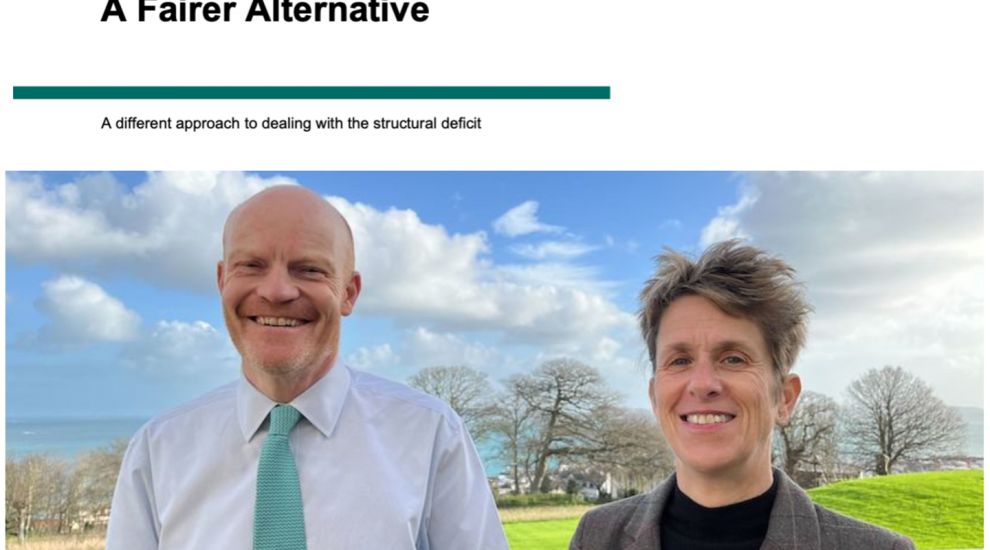

Four issues will dominate the tax debate which will reach a head next week when the States debate the official proposals and the amendments against them.
GST, corporate tax, capital spending and public sector savings - and the timing of them - are the lines on which the argument will be won or lost.
On Monday, Deputies Heidi Soulsby and Gavin St Pier published a report setting out an alternative way forward to Policy & Resources' Tax Review.
Express' Nick Mann looks at those aspects of their proposals.
Savings
In the five years since specific savings targets were put in place substantial increases in budgets have occurred.
In 2023 overall States spending is anticipated to increase by 8%, just under £50m., Health & Social Care’s revenue budget is up by over 11%.
The deputies behind the alternative package are confident there’s scope for both short and long-term savings which if achieved will lessen how much the taxpayer has to fork out.
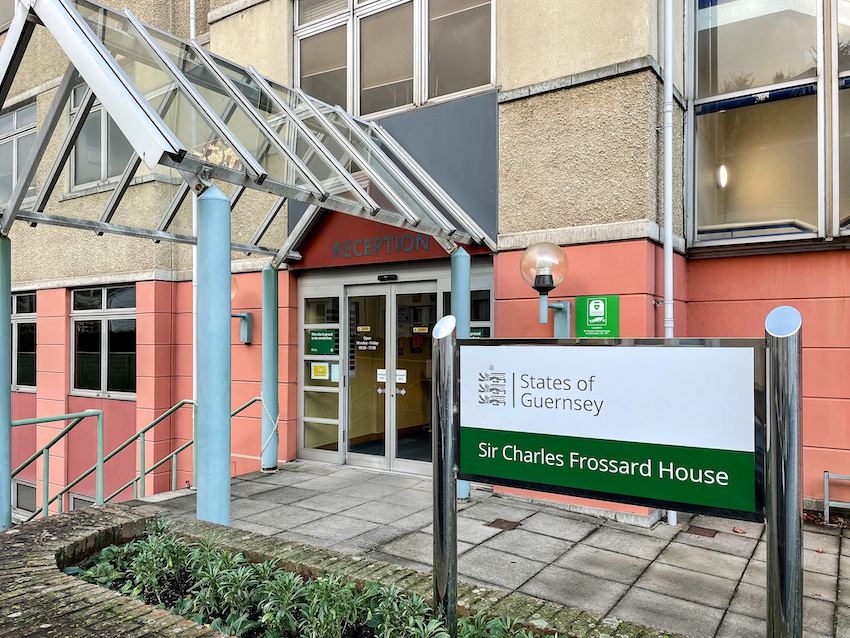
Pictured: The size and timing of public sector savings are one area of disagreement in the tax debate.
While Policy & Resources has argued for no real term spending increases in 2024 and 2025, the alternative approach goes further asking for a 1% reduction to save £9m. over two years.
“I would be astounded if we were unable to deliver that very, very modest ambition,” said Deputy St Pier.
Part of that confidence stems from the fact that States committees nearly always underspend the amount of money put aside for them each year.
Part of it because there is one-off spending that has been budgeted to deal with the impact of Covid that should not be needed again - ensuring that does not get ‘baked in’ is important.
Part comes from what has also been achieved in the past when targets have been in place. The Financial Transformation Programme, which ended in 2014, stripped out a recurring £28.7m. Even then, up to £12m. of savings identified that required better joint working were left on the table.
There are already other savings that are ripe for the picking.
“There are policy decisions that have been made by the States, which could help fully make savings but they can't be actioned, the committees don't have that support to actually do what has already been agreed to be done. We need to do this within government, working together,” said Deputy Soulsby.
Demonstrating the States is providing the services the public needs is seen as key to instilling trust in the need for raising more revenue.
Deputies Soulsby and St Pier have proposed a committee that reviews the role and size of government, reporting back before this term ends.
This is the “balanced approach” they say is needed.
A former Health & Social Services president, Deputy Soulsby has experience from last term of a review looking at the services it was providing and whether they could be done better by other bodies.
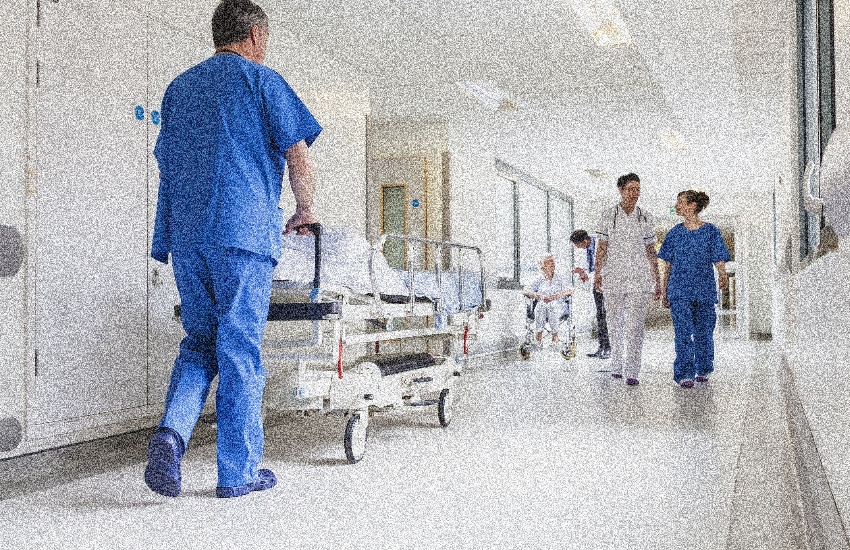
Pictured: A review is proposed of what services are provided by the States and whether they could be done differently to save money.
KPMG modelled that up to £17m. of cost reductions could be achieved.
“It’s understanding what government is providing to the public,” she said.
“Should it be fully subsidised? Part subsidised? Do we commission those services out? I don’t think people know all the things government does, where it comes from, it’s very dispersed, not very joined up. This is the opportunity to bring that into effect.”
Deputy St Pier said that a lot of work had also been done looking at savings within Education and Home Affairs as well as the Royal Courts.
“We’ve seen very little output from that in terms of operational changes,” he said.
“In essence, when we talk about the need to review the size and scope of government, we’re not starting with a blank sheet of paper. It’s about pulling together and making some decisions about it.”
The committee would consist of five States members elected next month and two non-States members.
Each year the States puts aside tens of millions in a pot for building projects.
Rules are in place to guide how much is meant to be spent on infrastructure, based on a percentage of the size of the economy.
It wasn’t long ago that this was 3% of GDP - but between 2008 and 2018 capital investment actually averaged 1.7%. Indeed, it was only in 2012 when the 3% barrier was broken with spending of 3.7%.

Pictured: Building of a Sixth Form Centre at Les Ozouets is one capital project this term that has already been delayed.
Projects tend to be slower than anticipated, a Scrutiny review found in 2020, with a silo mentality meaning that funding is not reallocated if they are delayed.
Prioritisation has also been a problem.
The alternative proposals suggest that States’ capital spending should average 1.5% of GDP as opposed to 2%, cutting the deficit by £19m. a year.
“I don't think people should make the mistake that we’re just saying we're going to spend less on capital,” said Deputy Soulsby.
“It's not about that at all. It's identifying the capital that needs to be spent, what projects should be done and making sure we can do that in a planned way.
“There's a whole raft of projects, which I don't think are properly understood in terms of cost, it's been difficult for us to actually get final figures for what these projects are.
“I know that we've got officers running around, not able to do everything that's on their plate at the moment. If you do too much, you do it badly, it's better to do a few things well, and spread that over a period of time than try to do everything all at once - I think we are in danger of doing that at the moment. It is about thinking strategically and one of my concerns over this term is there has been that tactical approach to everything and not looking beyond one or two years.”
In 2020, the Policy & Resources committee that Deputy St Pier headed up recommended a 1.5% of GDP assumption, but that was amended to 2%.
He said that an important part of the work that needed to be done was identifying what the island’s capital needs were, what can be delivered and when.
“At the moment, we have a very large bundle of capital projects, which is costed around about £500m, but it's just all in a big bucket. Actually, the deliverability of those really is constrained in very real terms by the capacity of the island, and the capacity of government to be able to deliver those projects in a given timeframe. We need to be much clearer over what time period we're going to be able to deliver those things. That should then drive what our capital spending needs are, rather than just in essence, picking a number. “
Critics of their plan argue that it would lead to underinvestment in maintaining the island’s infrastructure.
While Policy & Resources want to introduce a GST at 5% before the end of this term, the alternative package argues it is not needed - yet.
Instead, an assessment would be made in June 2026, once the impact of all their other measures is known.
“We can't say what the impact of all this will be by June 2026, but what we're saying is it needs to be done to see where we are,” said Deputy Soulsby
“GST is going to be expensive to bring in, it's going be difficult to bring in. More can be done before we have to bring in GST.”
Deputy St Pier has led propositions before that would have kept GST on the table, but that was heavily defeated in 2015.
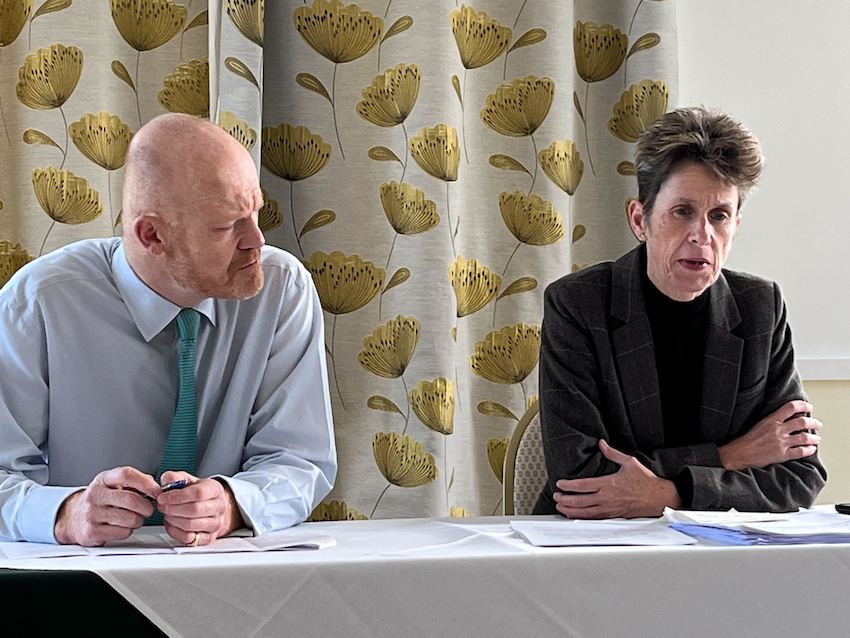
Pictured: Deputies Gavin St Pier and Heidi Soulsby do not think now is the time to introduce GST.
“My view was we had to learn to live with that decision,” he said.
“I’ve never since ruled out GST forever and a day. I think it would be foolhardy to do so. But now is the wrong time, we haven’t done enough work to demonstrate that it is needed. We haven’t done enough work to carry the community with us.”
He warned that P&R was seeking to raise £55m., but that was only part of the £100m. hole they said was there.
Deputy St Pier feared it would simply come back with higher rates of GST.
”Particularly because you're already spending 43% of it on sending it back to the community through lower income tax and higher allowances to try and mitigate the impact of GST. So for every pound, 43p is going back to the community.
"You know that you've introduced a tax system, which is inherently inefficient in that sense, in terms of the cycling of money around the economy. There could only be one way that that goes, which is to have a higher rate of GST to enable you to fill the rest of the black hole that is purportedly been identified by P&R themselves.”
The criticism of the package he led, which did not look to raise more money for the States, but change how it was raised, was that it was simply rearranging the deckchairs without achieving much more to make it worthwhile.
“We appear to have gone around the same cycle again, with the new committee’s work not having the level of public endorsement that was required, and not being bold enough in terms of the proposition to the public to win them over that this is all worth the gamble because all we're doing is partially solving the problem.”
All sides of the argument rely on increasing the amount of revenue raised from the corporate sector.
But the Alternative proposals want to move quickly, raising £10m. annually by 2025 from a new Community & Infrastructure Contribution while also reviewing the corporate tax regime.
The CIC levy was outlined in a report by EY that was commissioned by P&R, but has not made it into their proposals at this stage.
It would be aimed at businesses that do not make a tax contribution within the finance and professional services sector.
“The contribution will be perceived as an additional small increase in the cost of doing business and will not affect Guernsey’s corporate tax position,” the report compiled by Deputies Soulsby and St Pier said.
It would be charged through the Guernsey Registry annually as part of the company validation process which already happens.
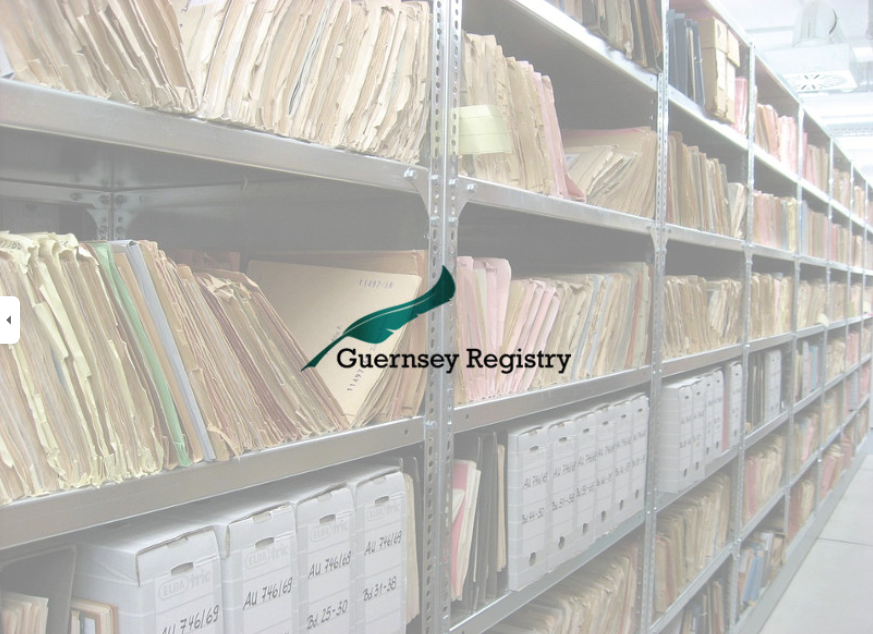
Pictured: An annual levy would raise £10m. a year from finance and professional services businesses under the alternative vision.
EY believes the levy could raise up to £20m. a year.
It could be adjusted depending on the outcome of a proposed review of the corporate tax regime.
The share of tax from corporates fell substantially when zero-10 was introduced in 2008.
Tweaks have been made to extend those businesses caught in the tax net, but they are effectively paying the equivalent of £37m. less in tax today as a proportion of total tax than they were in 2007.
The Soulsby/St Pier proposal would establish a special committee to review corporate tax with different options on the table.
The general rate of tax under zero-10 could be extended to 12.5% or even 15%.
“That's something that would need to be done in conjunction with Jersey and the Isle of Man,” said Deputy St Pier.
“We would engage with those other jurisdictions and see whether it's an area we could work in lockstep so that we all maintain our competitive position. Now, I'm aware from the previous positions I held that those conversations were perhaps taking place informally on the fringes over the years, but I don't think there's ever really been a formal engagement on it.”
A voluntary tax vehicle could be established based around income tax of 15%.
Consideration would also be given to moving to a territorial tax regime, something being championed by Deputy Charles Parkinson.
“We're not perhaps as bullish as he is with his amendment in terms of the immediate application of it,” said Deputy St Pier.
“But we absolutely believe an alternative corporate tax regime using the territorial basis is worthy of further work in a way that has not yet been done through the work that Policy & Resources have commissioned.”
Another option is a scheme used in Luxembourg known as taxe d’abonnement where a low base rate of tax is charged on assets under management.

Pictured: A tax used in Luxembourg has been cited as one way of reforming Guernsey's corporate tax regime.
The committee would also investigate incentivising company distributions.
Guernsey resident business owners do not need to pay any taxes as long as the profits are retained in the business.
It is believed there is a considerable amount of profits that are being retained like this, effectively deferring tax payments permanently.
Deputies Soulsby and St Pier believe they have adopted a measured approach.
“We’ve been very conscious not to set any hares running or scare any horses with the proposals and ensure that it’s done in a measured way, it allows plenty of time for investigation before further decisions are made.
“If there is further reform of corporate tax, for example, there is plenty of time for input from industry. But I think certainly from the conversations and my understanding of where the business bodies are coming from, one of the biggest criticisms is the lack of spending restraint and the control of the size of government, which is completely absent from the policy letter but is something that we're seeking to address.”
Social security changes help poorer families and 'middle Guernsey'
Tax plan includes 5% GST - but P&R says most families will be better off
Why States leaders STILL think GST and tax reform is needed
"Unacceptable" and "damaging" service cuts if States reject GST
Former VP reveals opposition to P&R tax plan
ANALYSIS: Resignation another symptom of the most divided States
Comments
Comments on this story express the views of the commentator only, not Bailiwick Publishing. We are unable to guarantee the accuracy of any of those comments.